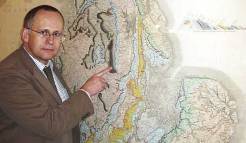
Geoscientist 20.06 July 2011
It has become a truism that future resource wars on our increasingly crowded planet are likely to fought over water at least as often as over energy resources. Yet we do not have to look very far for examples of water’s centrality to our everyday lives.
As hydrogeologist Mike Price memorably pointed out in his much-praised feature The wrong sort of rain (
Geoscientist 18.02 February 2008), most rain in the UK falls where few people live, and most of that runs into the sea because the rocks there are impermeable and the streams flashy. By contrast, south and east of the Tees-Exe line, where most people in the UK live, the rocks hold water well. But it hardly rains.
As Mike wrote: “The reasons for this owe a lot to geology, which controls the water supply of this country to a degree that few people – including most water engineers and many geologists – fully realise”. Many readers wrote in to say “amen to that” and to suggest that his article be required reading for all politicians in years when there is a drought in Britain (which seems like every year these days).
Concern over water resources is always high, but much of the strong opinion surrounding it forms in an information vacuum. But there are exceptions, for which the Society can claim some credit. The UK’s House of Commons Energy & Climate Change Committee
published its (generally) favourable report on shale gas and heeded geologists’ advice - that exploitation of this resource need not endanger groundwater supplies given proper regulation. Horror stories emanating from the US were much more an indictment of the Bush administration’s relaxation of environmental controls than of the well established practice of hydraulic fracturing.
But UK legislative frameworks for water resources are not perfect either. Industrial processes do threaten our water resources, as
Richard Lord and Don Mason show in their review of minewater pollution at Saltburn. As their story shows, there are still issues (in this case discharges from non-coal mines) falling between the cracks.
We can be glad, though, that the UK water supply rarely becomes a matter of life and death. Our
second feature reveals how the Royal Engineers – with embedded geologists – are helping rebuild the shattered infrastructure of Afghanistan by repairing the essential water supply infrastructure of troubled Helmand province. Knowing the ways of water, as hydrogeologists do, is essential to the task of undoing the havoc wreaked by natural processes when left to their own devices.
DR TED NIELD EDITOR